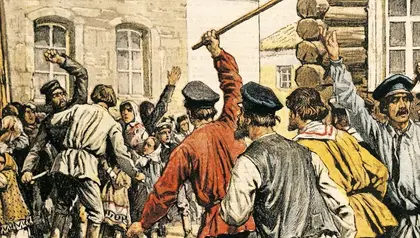As the saying goes, “You can judge people by the company they keep.” And while the domestic abuses in Iran and Russia leave little to the imagination about the similarities between the two states, it should come as no surprise that the countries’ attitudes to groups they consider enemies are the same.
As Iran continues to call for the annihilation of the state of Israel, Russia is only too happy to follow suit with domestic purges of Jewish centers. And while any connection of the Jewish people in Russia to their historic homeland languishes in the Kremlin’s purgatory, awaiting a court ruling, we are witnessing a full-scale appropriation of suffering by oppressors in a bid to keep their heads above the tide of inflicted abuses.
Before the start of the February 2022 invasion, Putin was only too happy to use the Ukrainian President’s heritage as a weapon, contesting the legislation on minority rights of Ukrainian citizens, reaching far beyond the Kremlin’s legal remit into the realms of meddling into internal affairs of a sovereign state. However, as the warmongering state went ahead with the full-scale invasion of Ukraine, Kremlin’s anti-Semitism entered the realm of the bizarre.
Peddling the perception of being surrounded by enemies, and with the ever popular Kremlin line of a NATO- and U.S.-controlled world order, Jews are once again at the forefront of blame. Undoubtedly, the rise of President Volodymyr Zelensky’s influence and status as the most influential Jew came as a blow to Putin, who had expected to make quick work of Ukrainian resistance and kill the Ukrainian leader within days of the invasion.
Now struggling to keep the offensive going, with a flailing army of recently mobilized and demoralized civilians, a new offensive on Zelensky’s Jewish heritage and the Jewish people has begun, with Russia moving to appropriate the Holocaust and mark those Jews who help Ukrainian resistance as collaborating with latter-day Nazis, as they continue to depict Ukrainians.
Russian Foreign Minister Sergei Lavrov’s recent remarks, comparing the West’s assistance to Ukraine in the country’s defense of national sovereignty to the actions of the Nazis against the Jews, come less than a year after he spoke of the West’s “Russian question” and stated that Adolf Hitler had Jewish blood.
The comment drew a sharp rebuke from the Israeli Prime Minister. While it is comforting to assume that such remarks are orientated to the undiscerning Russian audience, the statements have an air of historical continuity with the Russian establishment’s disdain for public expressions of Judaism.
The narrative of a common Zionist-Jewish enemy is well known among the adherents of the far right and left, with even the British institutional leftists in the Labour Party being proponents of anti-Semitic tendencies. And while the political establishment in the U.K. openly speaks out against such blatant violations of British law and human rights, not to mention simple decency and logic, Russian hunger for unity amongst those subservient to the Kremlin pushes ever further into identifying the Jews as the enemy through state sanctioned propagations of such beliefs.
Following the revelations of Israel’s ambassador to Germany on Israeli help to Ukraine – “behind the scenes and much more than is known” – Ilia Kiva, a pro-Russian former Ukrainian member of parliament, who has fled to Russia to become a staple on Russian public propaganda channels, went as far as saying the Jews secretly defile the Slavs with aid to Ukraine, saying that “it will end badly, first of all, for you [the Jews].”
While the Kremlin’s stance can be misconstrued as elite narratives, state control over the media and payouts for social media influencers have successfully trickled down to the public at large. And as in the past, Russian regard for Jews, according to a Levada Center poll, was higher than that for Ukrainians. Historic surveys show a disdain for the Jews during years of economic hardship.
Still, as Jewish voices outside of Russia remain cautiously optimistic about the future for Jews in the totalitarian state, the war in Ukraine and the cruelty of the aggressor’s army, as well as its disregard of own cadres’ lives, should act as a stark reminders for how Putin treats not just his enemies, but his subjects.
Speaking at a Henry Jackson Society event on the politics of anti-Semitism in Parliament, on Jan. 24, 2022, researcher and analyst Catherine Perez-Shakdam said “while flavors of anti-Semitism may differ between Iran, Russia and elsewhere, an overwhelming similarity is the need to present an enemy, justifying terror against the state’s own people and mask the agenda behind atrocities committed in violation of other countries’ sovereignty.
The Jews are a historic and easy target, and there cannot be any doubt that those who chose to follow the anti-Semitic path must not be reasoned with and should not be a part of civilized society. The invasion and atrocities in Ukraine notwithstanding, the unopposed anti-Semitic arguments emanating from Russia vis-à-vis Ukraine are only a sign of a growing rift between Russia and the civilized world on all levels.”
As Britain, Europe and the democratic world support Ukraine in their struggle, as well as their preparations for rebuilding the country, it is timely to pose the question of whether the Russian “Jewish question,” notwithstanding public support for the war and killings in Ukraine, together with bigotry against other ethnic minorities within Russia, have percolated so deeply that they form the bedrock of a Russian perception of the world and if it is reasonable to expect a Russian reintegration into global society.
The views expressed in this article are the author’s and not necessarily those of Kyiv Post.
You can also highlight the text and press Ctrl + Enter



